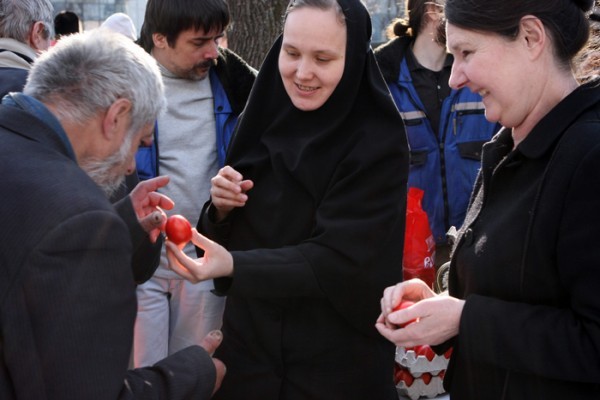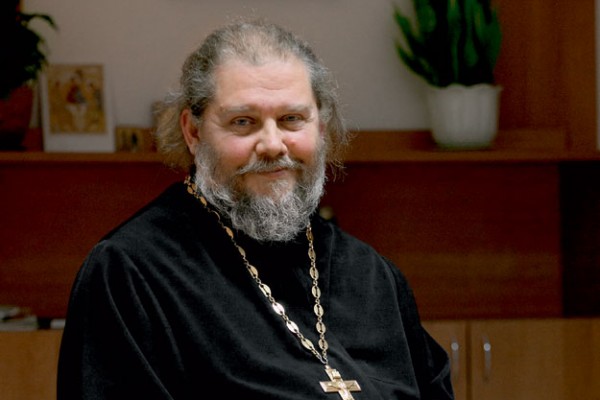I was an altar boy, when one Pascha, during the feast itself, I suddenly realised that I did not feel the joy of Pascha, of the Resurrection, as I had felt it before. It was a new feeling for me, very unsettling. I saw it as a kind of symptom, an indication that something within me was not right; an indication that I was badly prepared for the Paschal feast: I might not have fasted properly, or spent Great Lent unwisely; I might have broken a rule or done something wrong forgetting to confess it later. In other words, I assumed that the whole problem lay in my not having spent Great Lent well, and that was why the Paschal feast did not produce bright Paschal emotions in me. And Pascha, the Resurrection of Christ, did not resonate in me with the joy that could have been.
And yet, the whole point of Great Lent is to prepare for Pascha, for the feast of the Resurrection of Christ; it has no importance of its own. Apostle Paul says that if Christ is not raised, then our faith is vain (1 Cor. 15:17). In other words, our faith is futile, if we do not believe in the Resurrection of Christ. And this makes us contemplate that which is most important and most significant in Christianity, namely, faith in the Resurrection of Christ the Saviour.
This is why it is important. We all know that we all are mortal. Approximately around the age of six to seven or eight to ten we learn that one day we too will die. We know that everything on earth changes and that everything will come to an end. Everything will come to an end for us as well. But the soul cannot accept it, which is why the most terrifying affliction for anybody on earth is death. Death is what demeans all our joy; it demeans our youth, demeans love, it demeans domestic happiness, achievements, careers, and creativity. For if I am to exist no more, what is the point of it all? If everyone has to die, who am I labouring for, etc.? In other words, death is the main obstacle to life and human happiness. People live in an unceasing, almost constant fear of death. Fear of death is like the background of life. From the moment a child becomes aware of his mortality, fear of death becomes a constant, sometimes conscious, at times unconscious, background of his life. This fear of death consumes all joy; it consumes the satisfaction with one’s life, the joy of love, the joy of parenthood, the joy of creative success, and the joy of prayer.
So Christ comes and says, “There will be no more death. I have conquered death.” This is the Christians’ main happiness – the happiness of knowing that there is no more death. This is the joy that comes to us on Pascha. It is the joy of our own and each and everyone’s personal immortality. We are now immortal in Christ; we have nothing to fear from now on; we can be happy. The joy of Pascha should mean endless rejoicing, the resounding of bells, the singing of “Christ is Risen,” and love, an “all-embracing” love, as the Paschal stichera say.

Photo: http://foma.ru/
Life is Not a Zebra
However, what happens to a person who does not experience such joy? Not just Paschal, but everyday joy. This is when we ask the soul, what is happening within to prevent you from rejoicing? Some say, and justly, sins deprive us of happiness. That is true. Sin, unrepented, unrecognized, and misunderstood, stands between us and the Risen Christ. There is Confession though, isn’t there?
Often you hear believers say, “I repent, and I confess, and I commune. I commune every Sunday of Great Lent, but I experience no joy. I seem to be doing everything right; I attended Holy Unction, went over my whole life and confessed all my sins, but there is still no joy.” In that case, we must assume something else. Sins, forgotten or unconfessed sins, are not the only problem; there is something else. Sin is no longer a barrier between us and Christ; something else has become a barrier. Could it be a lack of faith in the most important, in the very victory over death?
Some say, “It could be a lack of belief in the resurrection of Christ,” and that is true. We go back to the words of St. Paul, “If Christ is not raised; our faith is vain.” Could it really be that our faith is vain? Could it be that our lack of faith in the resurrection of Christ robs us of the joy of Pascha? Very often, when faithful Christians say, “I believe in Christ’s resurrection, but I have no joy,” something is going on there, in the depths of their souls. There is an eclipse there; an eclipse of life itself, not only of the joy of Pascha. The essential purpose of life is eclipsed; the joy of simply living. The joy of this morning’s sunrise; the joy of the blue sky; the joy of smiling back at a person who is smiling at me because I love him and he loves me, because I am meeting the image and the likeness of God.
The ability to rejoice is at the very heart of our soul. I should say rather that the very nature of our soul, the spiritual substance, the spiritual essence is in itself rejoicing, is in itself blessedness, for it is an aspect of the being given to us by God. He said, “You will be in My image and My likeness.” And He is Spirit, He is Love, He is All Blessedness. The reflection of this blessedness is in the nature of our soul. In other words, the soul is in its very nature Christian, as Tertullian said. It is important to add that our soul in its very nature is also happiness and love.
So why aren’t we rejoicing if our souls are a torrent of love and the energy of joy? It is because our souls are obscured and not only with sin. We obscured it with fear; we concealed it beneath a thick armour of self-preservation. Sometimes people cannot rejoice just because they think they will have to grieve. Have you never heard the expression, “Life is like a zebra; first, comes a light streak, then a dark one.” Nothing can be more blasphemous. Life is not a zebra. If life is with God, it is a life of light, of joy, and of love despite all the existing suffering and tragedies. Joyful is not the same as carefree; joy is not devoid of sorrow; happiness is not without suffering. Yet, joy and happiness overcome suffering. They overcome it because they are stronger, just as the Lord is stronger than the devil, because light is stronger than darkness.
Our Paschal joy is the deep conviction that just as Christ is Risen, joy is stronger than sadness.
Lent: Tuning into Joy
I think that Great Lent naturally creates a feeling of expectation, creates festive emotions. It introduces us into the context of the events of the Gospel, into the philosophy of the Church, into an ecclesiastical understanding of what happens to a person’s soul and of what happened to Christ two thousand years ago. I think there is more to it though. Our experience of joy is lastingly connected to the internal perception of the life we lead and which was given to us by the Lord. This perception of life is like a backdrop of our entire existence. And this holds true not just for Great Lent, not just for Pascha, it applies to our entire being.
Very often I am approached by people who no longer desire to live. In these cases, it is almost impossible to speak to them of the joy of Pascha, because for them life is a burden and constant suffering. And don’t assume that I’m referring to people suffering physically from pain, disabled people, or people afflicted by grief or tragedy. Absolutely not. I’m speaking of those who lost their purpose in life.
I think that Great Lent can help guide people in their search for a purpose simultaneously providing them with a very important framework for it. This framework is planted in the texts of the Great Canon of St. Andrew of Crete, and in other texts read during Great Lent, in the texts of the Lenten Triodion, in the texts of the Menaion and of the Octoechos, in other words, in the liturgical books that are read daily.
Those texts meditate on the heroes of the Old and New Testaments, on people searching to encounter God, who lived, suffered, rejoiced, sinned, and repented. In other words, these texts contain, if I may say so, models of all human conditions, models of all our actions.
The ability to enjoy life is a special skill for adults, a skill that it is possible to acquire. Traditions, culture, and the framework of life are all part of it. Moreover, it is obviously an inner skill, an inner virtue – to live joyfully, to sense that life is joy, a gift, the greatest gift. It is gratitude to God! Knowing that your soul is a gift that will never be taken away, a priceless gift. This kind of inner disposition is faith.
The disposition of the soul is the foundation of the personality. On the contrary, fear and anxiety are like a veil that comes between the person and the world – a special perception of the world, a mistrust of the world…
For this reason, we can learn to rejoice. Joy is an achievement; I would even call it, a commandment. It is for this very reason that St. Paul says, “Rejoice always, pray continually, give thanks in all circumstances.” (1 Thess. 5:16-18)
Oksana Golovko spoke to Protopriest Andrei Lorgus
Translated from the Russian by Maria Nekipelov


















